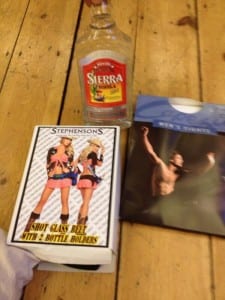There is often a scene in Shakespeare, a crowd scene, a feast or a ball that that can be beautifully realised with the budget of National Theatre but for small scale touring companies these scenes can be nightmares, how is it possible for a touring company with a small cast to create Shakespeare’s great crowd scenes.
Act 2 Scene 3 of Shakespeare’s Twelfth Night is one such headache, a party that must get suitably out of hand in order to justify Malvolio’s statement that Sir Toby and Sir Andrew “Make a alehouse of my lady’s house” (Twelfth Night, II.iii.88-9). There are two obvious solutions the first is simply to make Malvolio seem even more unreasonable by having him interrupt a particularly sedate party.
Filter Theatre found another far more interesting way however, with just a small cast they looked beyond the proscenium arch for their party. The scene starts slowly with much shushing and tip toeing and very quickly gets out of hand as games begin on stage, the audience members hurling fuzzy balls at the cast and later at each other, pizza brought into the stalls and distributed, tequila slammers are given out on stage. The audience are not just watching the party, they are as Michael Billington observed “participants in feast of misrule” (Billington, 2008).

Above is a picture of some of their party preparations for each show, tequila and shot belt included.
All of this brings the audience into the chaos so that when Malvolio does eventually interrupt it is particularly unwelcome and fosters antipathy in the audience and characters alike. So that when the wayward knights do get their revenge on Malvolio, a hilarious but disturbing twist on the yellow stockings, the audience need not feel any sympathy for him.
Filter realised that the audience need not be passive in theatre and used them to give the show life. There is of course a long history of audience participation in performance but here it was used to give an old over-performed text some life. In a way we found ourselves in a similar position love as a concept is the oldest story, it comes with all sorts of clichés attached and it occurred to us that the audience was a resource for keeping the work new and unpredictable just as it has been for so many others. One scene around the subject of marriage planning was getting nowhere until we stopped acting all the parts and turned it over onto some guinea pigs.
The other lesson from the chaos of Filter theatre was that the theatre can make the audience live something rather than just watch it. Theatre can evoke sensations; it can make a scene look how it feels for the characters. This is a principle we have applied with our scene about keeping secrets in relationships. We could have written a naturalistic dialogue of a wife finding out about her husband’s affair, a scene that would have a fairly slow start a climax and some kind of resolution. This felt like a betrayal of the kind of work we wanted to do, to create something that vibrant and new, we instead focused simply on the climax so that’s we started with lots of revelations being spouted as quickly as we could building to a cacophony of voices all competing with each other to confess and with each lie a physical action, the girl who loves musicals way too much dances a tango from Rent, while they are scattered with rubbish by messy people and the make-up addict liberally applies lipstick to our stage manager. The stage picture is as chaotic and manic as the ensuing argument might feel in real life
These two lessons from Filter have helped us a little to navigate our way through what could easily been dull, clichéd scenes. Giving us the tools to make theatre we hope will be a celebration of the human obsession with romance and not merely another replica of stories that have been told for thousands of years.
Works Cited
Billington, M. (2008) Twelfth Night Review. [online] London: Guardian. Available from http://www.theguardian.com/stage/2008/sep/03/theatre1 [Accessed 11 April 2014].
Shakespeare, W. (2010) Twelfth Night. London: Macmillan.
FilterTheatre (2013) First Day Rehearsing. [twitter] 27 August. Available from https://twitter.com/filtertheatre/status/372366949054828545/photo/1 [Accessed 14 April 2014]